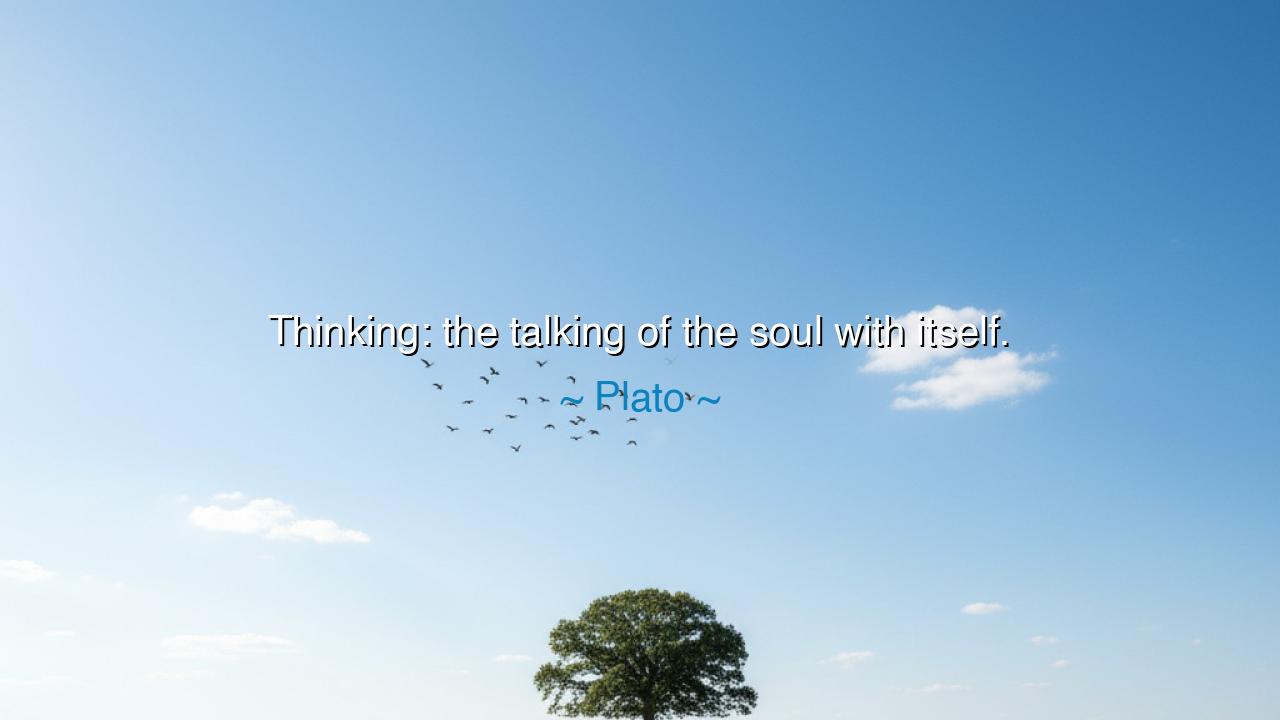
Thinking: the talking of the soul with itself.






“Thinking: the talking of the soul with itself.” — so wrote Plato, the philosopher whose words echo like sacred music across the corridors of time. In this phrase, he opens to us a window into the very mystery of human consciousness — the realm where the visible world fades, and the inner world awakens. To Plato, thinking was not a mere process of logic or analysis; it was a sacred dialogue — the conversation of the soul. When we think, he tells us, we commune not with the world outside, but with the divine spark within. It is in this still, invisible conversation that we discover truth, meaning, and the shape of who we are.
Plato lived in an age when wisdom was not written in ink, but spoken in the air — when philosophy was a living flame, passed from teacher to student, heart to heart. In his dialogues, he often portrayed his master, Socrates, who taught that the highest knowledge comes not from what others tell us, but from what we uncover within ourselves. Thus, thinking, as Plato describes it, is the inner voice of reason questioning, answering, and guiding the self — a form of divine introspection. The soul, when it “talks with itself,” is not idle; it is searching for truth that transcends mere opinion. In that sacred conversation, the mortal mind communes with the immortal essence of the self.
In this sense, Plato’s thought transcends time, for he understood that the truest teacher lives within. To think is to awaken the eternal dialogue between reason and desire, conscience and impulse, faith and doubt. Every human being carries this temple of dialogue inside — yet many flee from its silence. We fill our days with noise, fearing the voice within that asks us who we truly are. Plato’s wisdom calls us back to that quiet sanctuary, reminding us that the soul speaks in stillness. It is not in the shouting of the crowd, but in the whisper of conscience that truth reveals itself.
Consider the story of Marcus Aurelius, the philosopher-emperor of Rome. Surrounded by the burdens of empire, he could command armies, wealth, and power — yet he turned inward to converse with his own soul. In his meditations, written not for the world but for himself, he recorded the thoughts that shaped his being. “Look within,” he wrote, “for within is the fountain of good.” His reflections were not speeches to others, but the talking of the soul with itself, a dialogue that forged strength in the midst of turmoil. Through that inner conversation, he became not only a ruler of men, but a master of himself.
Plato’s wisdom also teaches that thought is the bridge between the human and the divine. When the soul speaks to itself, it draws upon the eternal order of truth that lies beyond mortal experience. Every great discovery, every act of creation, every moral awakening begins in that secret dialogue. The artist speaks to his vision before he paints; the philosopher debates within before he writes; the hero wrestles with his conscience before he acts. All greatness begins in thought, and all thought begins in the quiet counsel of the soul.
Yet there is also warning in this teaching: if the soul’s voice is silenced or ignored, man becomes adrift — like a ship without compass or wind. To think deeply, to listen to one’s inner voice, is not a luxury but a necessity for a life of meaning. The world teaches us to react; the soul teaches us to reflect. The world tempts us to speak; the soul urges us to listen. When we pause to commune with ourselves — when we truly think — we rise above the chaos of opinion and hear the timeless language of wisdom that has guided humanity since the dawn of reason.
So, dear seeker of truth, remember this: thinking is the sacred dialogue of your soul. Do not rush through life without hearing it. When confusion surrounds you, withdraw into that inner temple and ask your heart what is right. When joy comes, speak to your soul and give thanks. When sorrow visits, let your inner voice comfort and teach you. For in this quiet conversation, you will find not only guidance, but companionship — for the soul is never alone when it speaks to itself in truth.
Thus, heed the teaching of Plato: Think deeply, and know thyself. For to think is to live twice — once in the world of matter, and once in the world of spirit. Let your thoughts be honest, let your inner voice be kind, and let your soul never fall silent. For in that dialogue lies wisdom, and in wisdom lies peace.






AAdministratorAdministrator
Welcome, honored guests. Please leave a comment, we will respond soon